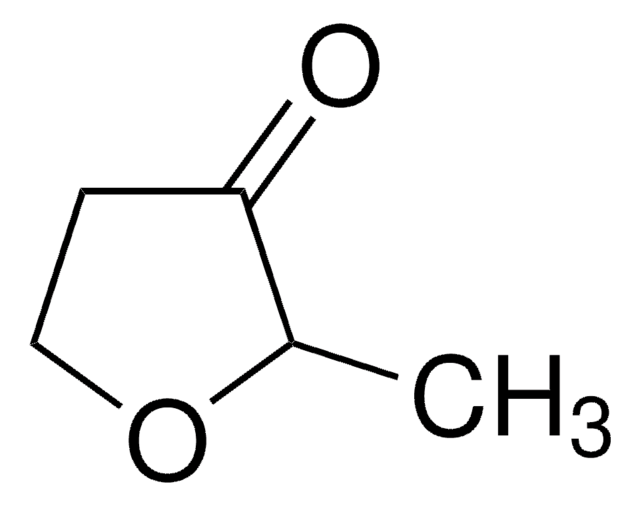W315303
5-Ethyl-3-hydroxy-4-methyl-2(5H)-furanone
97%, FG
Synonym(s):
Ethyl fenugreek lactone, Maple furanone
About This Item
Halal
Kosher
Recommended Products
biological source
synthetic
Quality Level
grade
FG
Halal
Kosher
Agency
meets purity specifications of JECFA
reg. compliance
EU Regulation 1334/2008 & 178/2002
Assay
97%
refractive index
n20/D 1.49 (lit.)
bp
83-86 °C/0.5 mmHg (lit.)
mp
31-35 °C (lit.)
application(s)
flavors and fragrances
Documentation
see Safety & Documentation for available documents
food allergen
no known allergens
Organoleptic
caramel; maple; fruity; sweet
storage temp.
2-8°C
SMILES string
CCC1OC(=O)C(O)=C1C
InChI
1S/C7H10O3/c1-3-5-4(2)6(8)7(9)10-5/h5,8H,3H2,1-2H3
InChI key
IUFQZPBIRYFPFD-UHFFFAOYSA-N
General description
Application
- RIFM fragrance ingredient safety assessment, 5-ethyl-3-hydroxy-4-methyl-2(5H)-furanone, CAS Registry Number 698-10-2.: This study evaluates the safety of 5-ethyl-3-hydroxy-4-methyl-2(5H)-furanone as a fragrance ingredient, providing comprehensive toxicological data and safety profiles (Api et al., 2024).
- Elucidating the Odor-Active Aroma Compounds in Alcohol-Free Beer and Their Contribution to the Worty Flavor.: This research identifies and quantifies the aroma compounds responsible for the flavor of alcohol-free beer, highlighting the significant role of 5-ethyl-3-hydroxy-4-methyl-2(5H)-furanone (Piornos et al., 2020).
Signal Word
Warning
Hazard Statements
Precautionary Statements
Hazard Classifications
Acute Tox. 4 Oral
Storage Class Code
11 - Combustible Solids
WGK
WGK 3
Flash Point(F)
235.4 °F - closed cup
Flash Point(C)
113 °C - closed cup
Personal Protective Equipment
Choose from one of the most recent versions:
Already Own This Product?
Find documentation for the products that you have recently purchased in the Document Library.
Customers Also Viewed
Our team of scientists has experience in all areas of research including Life Science, Material Science, Chemical Synthesis, Chromatography, Analytical and many others.
Contact Technical Service













